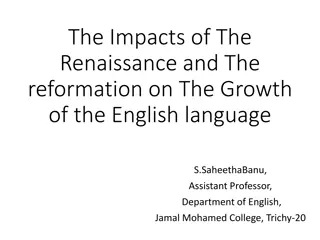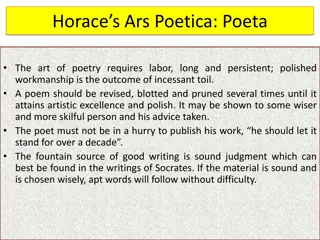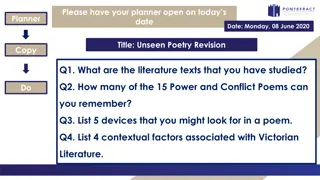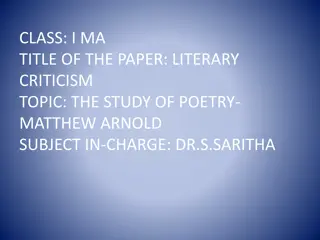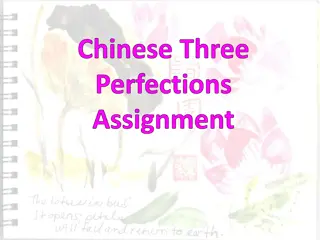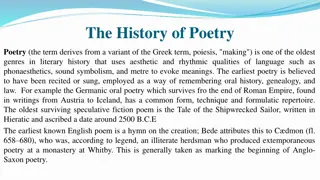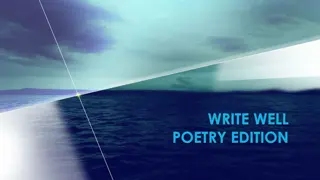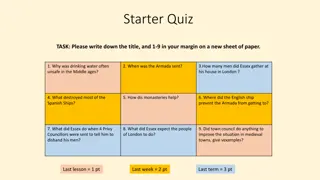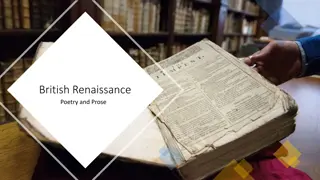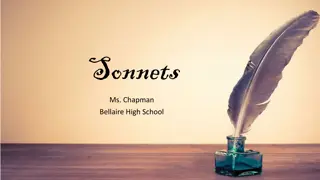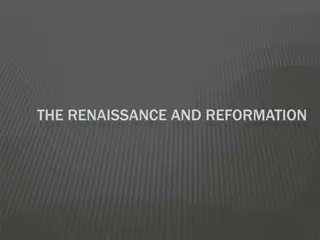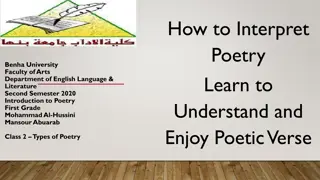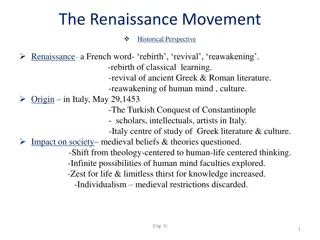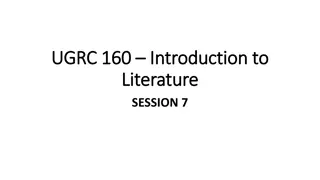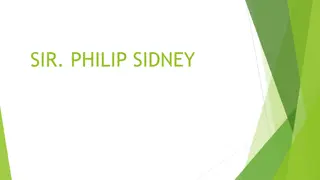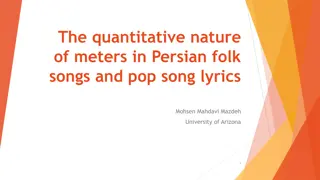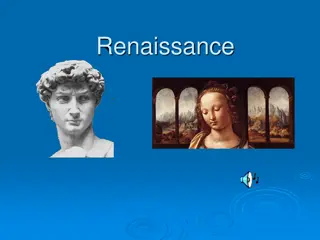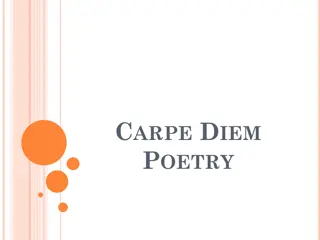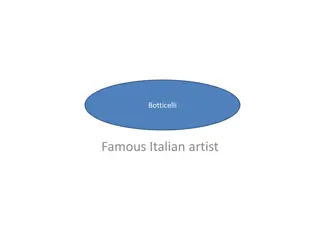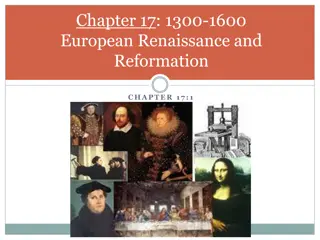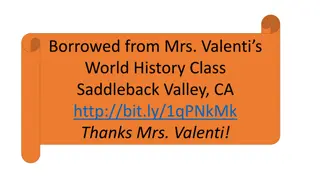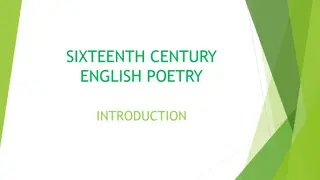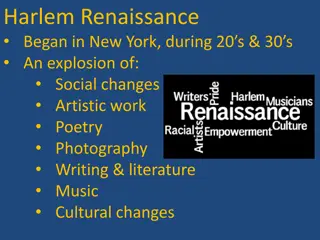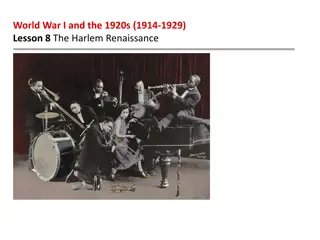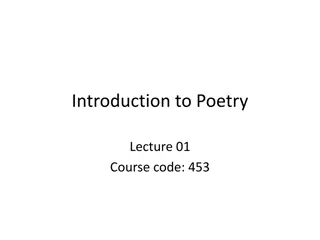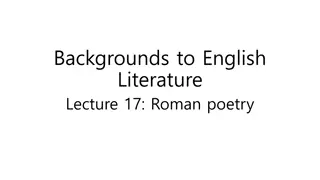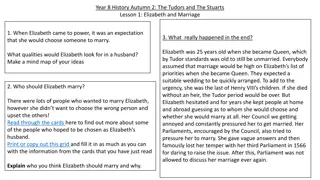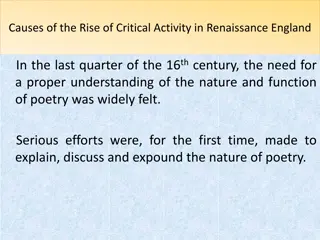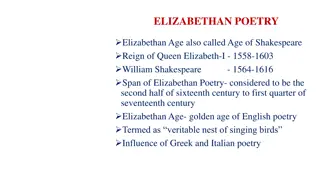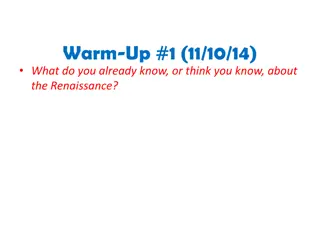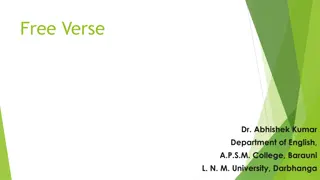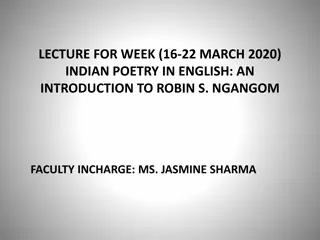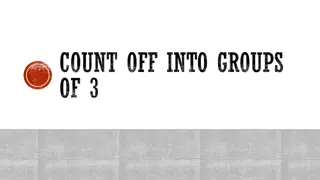Influence of Renaissance and Reformation on English Language Growth
The Renaissance and Reformation had significant impacts on the English language with changes in vocabulary, standardization of language, and spelling, influenced by Latin and religious terms. The Renaissance introduced Latin words, while the Reformation led to the translation of the Bible into Engli
5 views • 5 slides
Overview of Poetry Genres and Elements for English Students
Explore different genres of poetry including narrative, epic, dramatic, satirical, elegy, fable, and prose poetry. Delve into the unique elements of poetry such as diction and figurative devices like simile and metaphor. Engage with various examples from renowned poets and learn about the aesthetic
1 views • 25 slides
Evolution of Modern Poetry in the 20th Century
Modern poetry in English emerged in the early 20th century as a reaction to Victorian formalism. Modernists drew inspiration from diverse literary traditions, including Greek, Chinese, and Japanese poetry, to create works that depicted social changes and the impact of World War I. Themes of material
1 views • 7 slides
Insights from Horace's Ars Poetica on the Art of Poetry
Horace's Ars Poetica, also known as The Art of Poetry, provides timeless insights into the craft of poetry. The text emphasizes the importance of labor, revision, and sound judgment in creating polished and enduring works. It discusses the poet's role as an observer of life, the balance between inst
0 views • 5 slides
Unseen Poetry Revision: Exploring Literary Texts, Devices, and Contexts
Delve into the world of unseen poetry revision by analyzing literary texts, exploring poetic devices, and understanding contextual factors associated with Victorian Literature. Engage in vocabulary challenges, pre-reading activities, and discussions to enhance your understanding of poetry. Enhance y
3 views • 24 slides
Matthew Arnold's Literary Criticism: The Study of Poetry
Explore Matthew Arnold's approach to literary criticism focusing on the study of poetry. Arnold's work as a critic of literature, society, and religion is discussed, emphasizing his three estimates of poetry - the Real Estimate, the Historic Estimate, and the Personal Estimate. The Real Estimate hig
1 views • 9 slides
Exploration of 17th Century Literature: Themes, Poets, and Poetry Schools
The literature of the 17th century in London is characterized by melancholic themes, centered around notable figures like John Milton. The era saw the rise of two distinct schools of poetry - metaphysical and cavalier poetry. Metaphysical poets like John Donne employed unconventional metaphors and e
0 views • 5 slides
Chinese Three Perfections: Poetry, Calligraphy, and Painting
Scholars from the Tang period through the Ming era in China highly esteemed the three perfections – poetry, calligraphy, and painting. Calligraphy, considered the highest art form, reveals a person's nature. Poetry, akin to painting with sound, was crucial during the Tang dynasty. Painting, often
3 views • 14 slides
A Journey Through the History and Elements of Poetry
Explore the rich history of poetry from ancient times to modern eras, delving into its evolution, forms, and significance. Discover the core elements of poetry and its distinctions from prose and drama. Uncover the genres, themes, and iconic works that have shaped the world of poetry as we know it t
1 views • 9 slides
Poetry Playground: A Journey Through Verses and Creativity
Delve into the enchanting world of poetry with Write Well Poetry Edition. Explore the art of crafting "I Am" poems, acrostics, and vibrant expressions. Uncover the simplicity of creating acrostics in five steps and embrace the beauty of poetic imagery. Discover poetry rules, captivating verses, and
1 views • 39 slides
Impact of the Renaissance on Medicine in Early Modern Britain
In the early modern period in Britain from 1450 to 1800, the Renaissance brought about significant changes to medicine. This era marked a rebirth in Europe with increased interest in classical architecture, art, and scientific advancements. The impact of the Renaissance on medicine included the chal
9 views • 8 slides
Exploration of Various Poetry Forms: Descriptive, Narrative, Dramatic, and Metaphysical
Poetry is a diverse art form encompassing descriptive portrayal, storytelling narratives, engaging dialogues, and profound metaphysical insights. Descriptive poetry vividly captures objects and scenes like paintings, narrative poetry weaves interconnected stories, dramatic poetry involves dialogues,
1 views • 11 slides
Coleridge's Cardinal Points of Poetry in Biographia Literaria
Coleridge's Chapter 14 in Biographia Literaria delves into the cardinal points of poetry, emphasizing the power to evoke reader sympathy through truth to nature and novelty through imaginative coloring. He discusses the difference between poetry and prose, highlighting the poet's role in crafting or
1 views • 37 slides
British Renaissance Poetry and Prose: Influential Poets and Their Works
Explore the world of British Renaissance poetry and prose through the works of renowned poets like Sir Thomas Wyatt, Edmund Spenser, and Sir Philip Sidney. Dive into the evolution of the sonnet form, from Wyatt's introduction of the Italian/Petrarchan sonnet to Spenser's masterpieces like "The Faeri
1 views • 13 slides
Love and Sonnets in the Italian Renaissance
Explore the themes of love and sonnets during the Italian Renaissance, where conflicting views on love were expressed through art, literature, and poetry. Learn about Petrarch, a renowned poet who channeled his unrequited love for Laura into Petrarchan sonnets, a poetic form that epitomizes pure lov
0 views • 14 slides
AAPI Women Voices: Untold Stories Through Poetry Curriculum
Explore the empowering journey of AAPI women through poetry with the AAPI Women Voices curriculum. Delve into untold stories, reflect on performances, and discover the impact of poetry in shaping perspectives and voices. Engage in critical reflections, anticipate poetry's essence, and embrace the ar
0 views • 6 slides
The Renaissance and Reformation in Italy: A Historical Overview
The Renaissance and Reformation in Italy marked a period of rebirth and transformation between 1350 and 1550. The Italian Renaissance saw a resurgence of interest in ancient Greek and Roman cultures, characterized by urban growth, secular viewpoints, and a focus on individual ability. City-states li
0 views • 91 slides
Enjoying Poetry: A Comprehensive Guide
Delve into the world of poetry with this comprehensive guide that explores the differences between prose and poetry, various types of poetry like cinquain and diamante poems, and the essence of haiku. Learn how to interpret and appreciate poetic verse through detailed explanations and examples. Unra
0 views • 26 slides
The Renaissance Movement: Historical Perspective and Impact on English Literature
The Renaissance, meaning "rebirth," was a period of revival in classical learning, centered in Italy after the Turkish Conquest of Constantinople in 1453. This era saw a shift from medieval beliefs to human-centered thinking, with a focus on exploring the limitless possibilities of the human mind an
0 views • 9 slides
Introduction to Poetry Analysis: Techniques and Approaches" (66 characters)
Delve into the world of poetry analysis with key insights on understanding the poet's craft, approaching unseen poems confidently, and identifying literary devices to unravel thematic content. Explore how to analyze poems effectively using the ART WARS framework and break free from common misconcept
1 views • 12 slides
Sir Philip Sidney: The Ideal Renaissance Gentleman
Sir Philip Sidney (1554-1586) exemplified the perfect courtier and universal gentleman of the English Renaissance. His life as a poet, courtier, diplomat, and soldier was marked by romantic disappointments, political involvement, and literary contributions such as "Arcadia," "Astrophel and Stella,"
0 views • 9 slides
Quantitative Meters in Persian Folk Songs and Poetry
Delve into the quantitative nature of meters in Persian folk songs and pop song lyrics as discussed by Mohsen Mahdavi Mazdeh at the University of Arizona. The study explores how syllable weight, vowel length, and metrical patterns play vital roles in classical Persian poetry and the poetry of spoken
0 views • 19 slides
The Renaissance: A Period of Innovation and Transformation
The Renaissance period marked a significant shift in European history, bridging the gap between the Middle Ages and the modern era. It was characterized by a renewed focus on humanism, art, education, and science, leading to groundbreaking developments in various fields. This era saw the rise of pri
0 views • 31 slides
Renaissance Poets and Poetry
Delve into the lives and works of prominent Renaissance poets like Christopher Marlowe, Sir Walter Raleigh, Robert Herrick, and Andrew Marvell. Learn about pastoral poetry, sonnets, Petrarchan/Italian sonnets, and the Latin phrase "Carpe Diem" meaning seize the day. Uncover the rich history and capt
1 views • 15 slides
Exploring Various Definitions of Poetry
Delve into the multifaceted nature of poetry through different perspectives such as poetry as a lie according to Plato, poetry as truth per Aristotle, poetry as prophecy as observed by T.S. Eliot, poetry as an expression of emotion according to Wordsworth and Mills, and poetry as substance as articu
0 views • 13 slides
Sandro Botticelli: Masterpieces of the Florentine Renaissance
Alessandro di Mariano di Vanni Filipepi, known as Sandro Botticelli, was a renowned Italian artist of the Florentine Renaissance. His iconic works such as "The Birth of Venus" and "La Primavera" are celebrated for capturing the essence of the Renaissance period. Botticelli was among the first Wester
0 views • 5 slides
European Renaissance and Reformation: A Time of Innovation and Transformation
The European Renaissance and Reformation period from 1300-1600 was a time of significant change and progress in art, learning, and religion. The Renaissance brought about a rebirth in art and human potential, with a focus on secular achievements and the support of patrons. Meanwhile, the Reformation
0 views • 29 slides
Italian Renaissance: Writers and Artists Spotlight
Italian writers like Dante Alighieri and Niccolo Machiavelli made significant literary contributions during the Renaissance period. Dante's iconic work, "The Divine Comedy," showcased societal issues, while Machiavelli's "The Prince" offered political advice emphasizing practicality over theory. Ita
0 views • 22 slides
Overview of Sixteenth Century English Poetry and the Renaissance
The introduction provides insights into sixteenth-century English poetry, the Renaissance era, and the defining characteristics of the period. It delves into the intellectual, religious, political, and social contexts of the time, highlighting key figures and movements like the Reformation, the Grea
1 views • 12 slides
Harlem Renaissance: A Cultural Explosion in New York During the 20s and 30s
The Harlem Renaissance was a transformative period in New York during the 1920s and 1930s, marked by significant social and artistic changes. It witnessed an eruption of creativity in various forms such as poetry, photography, writing, literature, and music. Iconic figures like Langston Hughes, Coun
0 views • 9 slides
The Harlem Renaissance and Jazz Age in the 1920s
The Harlem Renaissance and Jazz Age of the 1920s were significant cultural movements that emerged in the aftermath of World War I and the Great Migration. African Americans experienced a cultural renaissance, with the development of jazz music, literature, and art, exemplifying their resilience and
0 views • 16 slides
Poetry: Forms, Devices, and Rhythms
Poetry utilizes various forms, devices, and rhythms to evoke emotions and convey multiple layers of meaning. Poetic devices such as rhyme, rhythm, metaphor, and simile play a crucial role in creating musicality and depth in poems. Understanding the organization of speech rhythms, accent patterns, an
0 views • 45 slides
Overview of Roman Poetry and The Eclogues: A Study in Roman Literature
Roman poetry encompassed various genres such as epic, drama, lyric, satire, and pastoral, with poets like Virgil and Catullus making significant contributions. The neoteric poets, inspired by Hellenistic traditions, added a new dimension to Roman poetry. The Eclogues by Virgil, drawing from Theocrit
1 views • 17 slides
Insights into Tudor and Renaissance Periods: Marriage, Medicine, and Beliefs
During this history lesson, students explore Queen Elizabeth I's reluctance to marry, potential suitors, and the development of medicine during the Renaissance period. They delve into the beliefs surrounding illness causation, treatment methods, and changes from the Middle Ages to the Renaissance.
0 views • 13 slides
Causes of the Rise of Critical Activity in Renaissance England
In the last quarter of the 16th century, Renaissance England saw a surge in critical activity surrounding poetry. This was spurred by factors such as the medieval view of poetry, the appreciation of poetry in courtly circles, influence from the rediscovery of Aristotle's Poetics, and challenges pose
0 views • 6 slides
Insights into Elizabethan Poetry: A Glance at the Golden Age
The Elizabethan Age, also known as the Age of Shakespeare, during Queen Elizabeth I's reign from 1558 to 1603, marked a golden era in English poetry. This period saw a flourishing of poetic forms influenced by Greek and Italian poetry. Major poets like Edmund Spenser, Sir Philip Sidney, and William
0 views • 6 slides
Renaissance Warm-Up Activities Series
This series of warm-up activities covers various aspects related to the Renaissance period, including general knowledge about the Renaissance, distinguishing between the Middle Ages and the Renaissance, exploring Machiavellian principles, matching art descriptions with artists, and discussing rules
0 views • 10 slides
Free Verse Poetry: Definition, Examples, and Analysis
Free verse poetry, as explored by Dr. Abhishek Kumar, defies traditional poetry rules by liberating poets from meter and rhyme constraints. This form allows unlimited artistic expression through unique structure and uses poetic devices like alliteration and rhythm. Examples from Walt Whitman and Ezr
1 views • 7 slides
Indian Poetry in English through the Works of Robin S. Ngangom
This lecture delves into Indian Poetry in English, focusing on the experimental phase and introducing poet Robin S. Ngangom. It discusses the key features of Indian poetry in the experimental phase, social progress, and Ngangom's background, poetic style, and themes. The lecture sheds light on Ngang
0 views • 7 slides
Poetry: Definition, Analysis, and Appreciation
Delve into the world of poetry through discussions on what poems and poetry are, exploring dictionary definitions, famous quotes, and the transformative power of reading and analyzing poetry. Engage in group activities, examine the works of poets like Mina Loy and Mark Yakich, and discover the uniqu
0 views • 8 slides
